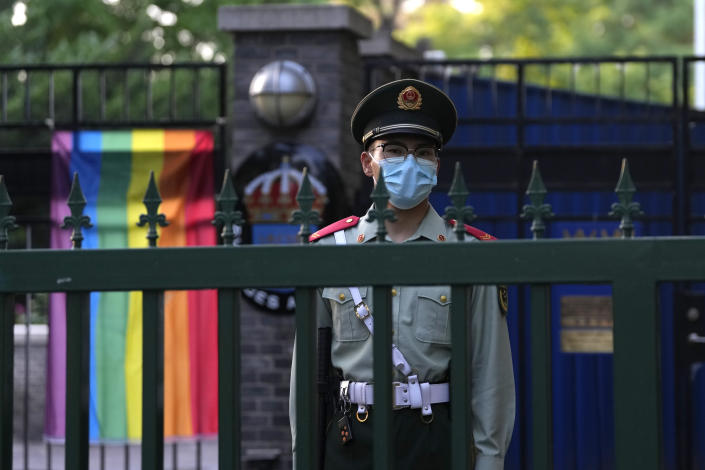Beijing LGBT Center shuttered as crackdown grows in China

Views (202)

An advocacy group that also served as a safe space for the LGBTQ community in Beijing became the latest organization to close under a crackdown by Chinese leader Xi Jinping's government. “We very regretfully announce, due to forces beyond our control, the Beijing LGBT Center will stop operating today,” read a notice posted on the center's official WeChat account Monday night. Beijing LGBT Center did not respond to an email request for comment.
TAIPEI, Taiwan (AP) — An advocacy group that also served as a safe space for the LGBTQ community in Beijing became the latest organization to close under a crackdown by Chinese leader Xi Jinping's government.
“We very regretfully announce, due to forces beyond our control, the Beijing LGBT Center will stop operating today,” read a notice posted on the center's official WeChat account Monday night.
Beijing LGBT Center did not respond to an email request for comment. The Ministry of Civil Affairs, which oversees nonprofits in China, also did not immediately respond to a faxed request for comment.
The group’s shuttering marks a critical blow for advocacy groups that once had been able to be public about their work for LGBTQ+ rights.
“They are not the first group, nor are they the largest, but because Beijing LGBT Center was in Beijing, it represented China's LGBT movement,” said one Chinese activist who requested anonymity out of fear for his safety. “In our political, economic and cultural center, to have this type of organization. It was a symbol of the LGBT movement's presence.”
The Beijing LGBT Center described its mission as evolving; it started as a safe space for the community to host events. Then it became an advocacy group aiming to "improve the living conditions for the sexually diverse community.” They offered low-cost mental health counseling and published lists of of LGBTQ-friendly health professionals.
In the past few years, that limited space has shrunk further.
In face of the constant pressure, he said, sometimes groups are not able to openly inform the community they serve about politically sensitive events they held, which would cause confusion.
Before the crackdown, LGBT Rights Advocacy China built a network of lawyers who were sympathetic and willing to help LGBTQ+ people with legal issues. They had several visible nationwide campaigns pushing for policy changes, such as recognizing same-sex marriage, through targeted lawsuits.
Police pressure on rights groups increased in the past few years, the activist said. Police often invited LGBTQ+ groups to “drink tea” — a euphemism for unofficial meetings that police use to keep track of certain targets. That used to happen in public spaces, but started taking place in private spaces, such as directly in front of activists’ homes. Police also started taking activists to the police station for these “teas,” the activist said.
LGBTQ+ organizations often don't officially register, as it is difficult for them to get government approval, and officially registered groups that partner with them have also came under pressure. Sometimes groups, especially small ones, are shut down without an opportunity to tell the public, the activist said.
“The ones we've seen aren't just these few, but actually the majority have shut down,” the activist said. “The pressure has continuously grown. It's never stopped.”
Until Monday, the Beijing LGBT Center stayed in operation despite the censors and growing pressure. The group worked with the United Nations Development Program to conduct a nationwide survey on sexuality and gender in 2015, aiming to provide a baseline on the hardships that face LGBTQ+ people living in China. The survey asked respondents about their access to social services, health care, and how societal attitudes affected them.
In recent years, the group has focused on workplace diversity and inclusion. Last week, the center posted an article celebrating 15 years of work. “Beijing LGBT never had much money, and very few staffers, it was all dependent on hundreds of volunteers," the article read.
“Their shutdown makes one feel very helpless. As groups large and small shut down or stop hosting events, there’s no longer a place where one can see hope,” said another Chinese activist who requested anonymity for fear of government retribution.
0 Likes
